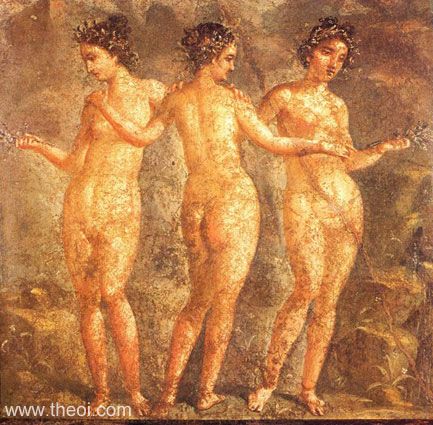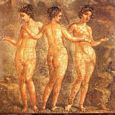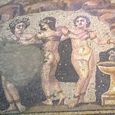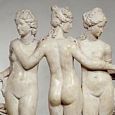THALIA
Greek Name
Θαλια Θαλιη Θαλεια
Transliteration
Thalia, Thaliê, Thaleia
Latin Spelling
Thalia
Translation
Festivitiy (thalia)

THALIA was one of the three Kharites (Charites) and the goddess of festivity and banquets. She was usually depicted dancing in a circle with her two sisters.
Her name was derived from the Greek adjective thalia which, when applied to banquets, means rich, plentiful and luxuriant. She was probably the same as Pandaisia (Banquet), a Kharis companion of Aphrodite in Athenian vase painting. Thalia's name also means "the blooming"--in the sense of springtime greenery and blossoms (cf. the Hora Thallo).
FAMILY OF THALIA
PARENTS
[1.1] ZEUS & EURYNOME (Hesiod Theogony 907, Apollodorus 1.13, Pausanias 9.35.1)
[1.2] ZEUS & EUNOMIA (Orphic Hymn 60)
CLASSICAL LITERATURE QUOTES
Hesiod, Theogony 907 ff (trans. Evelyn-White) (Greek epic C8th or C7th B.C.)
:
"And Eurynome, the daughter of Okeanos (Oceanus), beautiful in form, bare him [Zeus] three fair-cheeked
Kharites (Charites. Graces), Aglaia (Aglaea), and Euphrosyne, and lovely Thalie (Thalia), from whose eyes as
they glanced flowed love that unnerves the limbs: and beautiful is their glance beneath their brows."
Pindar, Olympian Ode 14. 1 ff (trans. Conway) (Greek lyric C5th B.C.) :
"Whose haunts are by Kephissos' (Cephisus') river, you queens [the Kharites] beloved of poets' song, ruling
Orkhomenos (Orchomenus), that sunlit city and land of lovely steeds, watch and ward of the ancient Minyan race,
hear now my prayer, you Kharites (Charites, Graces) three. For in your gift are all our mortal joys, and every
sweet thing, be it wisdom, beauty, or glory, that makes rich the soul of man. Nor even can the immortal gods
order at their behest the dance and festals, lacking the Kharites' aid; who are the steward of all rites of
heaven, whose thrones are set at Pytho beside Apollon of the golden bow, and who with everlasting honour worship
the Father, lord of great Olympos.
Euphrosyne, lover of song, and Aglaia revered, daughters of Zeus the all-highest, hearken, and with Thalia,
darling of harmony, look on our songs of revel, on light feet stepping to grace this happy hour . . . I come to
praise Asopikhos (Asopichus), whose Minyan house, Thalia, now of your favour wears the pride of the Olympian
victor."
Pseudo-Apollodorus, Bibliotheca 1. 13 (trans. Aldrich) (Greek mythographer C2nd A.D.)
:
"By Okeanos' (Oceanus') daughter Eurynome he [Zeus] had the Kharites (Charites, Graces), named Aglaia
(Aglaea), Eurphrosyne, and Thaleia."
Pausanias, Description of Greece 9. 35. 1 (trans. Jones) (Greek travelogue C2nd A.D.)
:
"Hesiod in the Theogony says that the Kharites (Charites, Graces)) are daughters of Zeus and
Eurynome, giving them the names of Euphrosyne, Aglaia (Aglaea) and Thalia."
Orphic Hymn 60 to the Charites (trans. Taylor) (Greek hymns C3rd B.C. to 2nd A.D.)
:
"Illustrious Kharites (Charites, Graces), mighty named, from Zeus descended, and Eunomia famed [here
identified with the Okeanis Eurynome], Thalia and Aglaia (Aglaea) fair and bright, and blest Euphrosyne, whom
joys delight."
ANCIENT GREEK & ROMAN ART
SOURCES
GREEK
- Hesiod, Theogony - Greek Epic C8th - 7th B.C.
- Pindar, Odes - Greek Lyric C5th B.C.
- Apollodorus, The Library - Greek Mythography C2nd A.D.
- Pausanias, Description of Greece - Greek Travelogue C2nd A.D.
- The Orphic Hymns - Greek Hymns C3rd B.C. - C2nd A.D.
BIBLIOGRAPHY
A complete bibliography of the translations quoted on this page.


